The Department of Surgery at Washington University School of Medicine in St. Louis offers an array of research opportunities with world-class mentors. With approximately 61,000 square feet of laboratory space in three research buildings, the department ranks among the top U.S. academic surgery departments in annual NIH, non-federal and corporate funding. Residents and Research Fellows are encouraged to explore research opportunities in surgery, immunology, genetics, public health, education and other areas related to advancing the field of surgery. Below are some of the research opportunities currently available within our department.

Current research of faculty members in the Section of Acute and Critical Care Surgery focuses on genetics, prevention of deep venous thrombosis (DVT) and curriculum improvement in surgical education.
Grant Bochicchio, MD, MPH, Section Chief of Acute and Critical Care Surgery, leads research aimed at improving the care of critically ill patients. His research projects have been funded by grants from the NIH and Department of Defense. Bochicchio is the local PI on a national, multicenter trial comparing ventilation methods for trauma patients at risk of developing acute respiratory distress syndrome. Another recent clinical study investigated the effects of tranexamic acid on blood loss in severely injured trauma patients. The section is also a participating site in LITES (Linking Investigations in Trauma and Emergency Services) Network research projects through the Department of Defense. Additional research projects focus on surgical education in acute and critical care surgery. For more information, contact Dr. Bochcchio at (314) 362-5298.
The Cardiothoracic Surgery Research Laboratory is a joint laboratory of all the general thoracic and cardiac surgeons. Their research is supported by multiple NIH R01 grants, a T32 training grant, a K08 grant, individual National Research Service Awards, American Heart Association grants, American Society of Transplant Surgeons grants and Barnes-Jewish Hospital Foundation grants. Industry partnerships and the Division of Cardiothoracic Surgery provide additional funding. A joint optical mapping facility shared by pathology, cell and molecular biology, medicine and neurology is located in the cardiothoracic surgery laboratory. The laboratory’s full-time staff includes trained animal technicians, molecular biology technicians, computer and electronic engineering staff, and administrative support staff. These individuals are not only involved in research, but have a primary task of training students and research fellows. The sharing of equipment and expertise not only facilitates research, but also provides a broader research training experience for their research fellows.
Eghtesady Lab
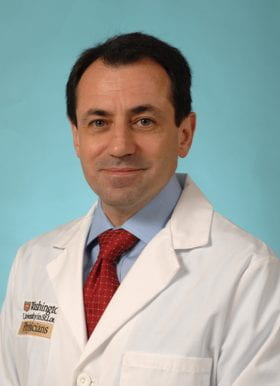
Pirooz Eghtesady, MD, PhD, Section Chief of Pediatric Cardiothoracic Surgery, researches the pathogenesis of congenital heart diseases, focusing on aortic stenosis and hypoplastic left heart syndrome. His lab’s long-term goal is to eradicate congenital heart disease through better understanding of the mechanisms involved in its pathogenesis. Currently their research is focused on determining the role of maternal viral exposure, by analyzing the maternal virome and antibody repertoire, and HLA status in the causation of CHD, a novel and exciting area of investigation. While a significant portion of the research endeavor is on the analysis of cardiotropic viruses, there is also interest in the broader virome, including novel viruses. The Eghtesady lab has expertise in several relevant animal models, virology assays and cardiac chamber-specific knockout models which will be important for success in this project. Together, the aim is to identify new pathways of CHD pathogenesis as well as better understand the interplay between the maternal immune response and the fetus. More information about the lab’s research can be found here. For more information, contact Dr. Eghtesady at eghtesadyp@wustl.edu or (314) 454-6165.
The Section of Colon and Rectal Surgery has a strong commitment to medical and scientific research with ongoing collaborative projects that focus on state-of-the art research related to colorectal surgery. Faculty in this section maintain a Crohn’s disease tissue bank and database as well as a database for hereditary colon and rectal cancer. Washington University colorectal surgeons regularly participate in clinical trials to improve the care of patients with colorectal cancer and other conditions. Recently, faculty participated in an international multicenter trial to study the impact of neoadjuvant therapies on disease-free survival of patients with locally advanced rectal cancer. The results of this trial have led to a new standard of care for those patients at Washington University. Other research aims to improve diagnostic and surveillance imaging for colorectal cancer. The section also engages in collaborative projects on the genetics of colorectal cancer and its therapies and the CREATE (Comprehensive Research on Expressed Alleles in Therapeutic Evaluation) Pharmacogenetics Research Network at Washington University School of Medicine. For more information, contact Dr. Mutch at (314) 454-7177.
Washington University hepatobiliary-pancreatic and gastrointestinal surgeons are leaders in research focused on developing novel pancreas cancer therapeutics, improving surgical safety, genomic analysis of primary and metastatic solid tumors, and the early detection of pancreas cancer and metastases, among other areas of investigation. The section is home to a SPORE (Specialized Programs of Research Excellence) in pancreatic cancer, the cornerstone of the National Cancer Institute’s effort to promote collaborative, interdisciplinary translational cancer research.
DeNardo Lab
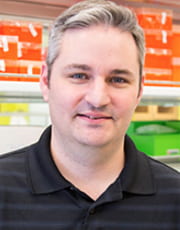
David DeNardo, PhD, professor of medicine, and William Hawkins, MD, Section Chief of HPB-GI Surgery, conduct research to understand how immune responses shape and are shaped by malignancies. The lab aims to exploit these weaknesses to improve patient outcomes by enhancing response to conventional, targeted or immunotherapeutics. At current the laboratory focuses primarily on pancreas and breast cancers. For more information, contact Dr. DeNardo at ddenardo@wustl.edu or at (314) 362-9534.
Hammill Lab
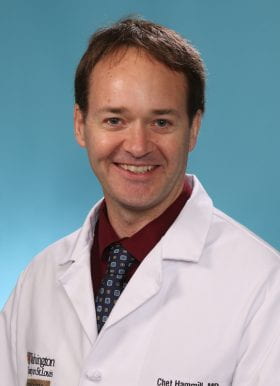
Chet Hammill, MD, MCR, FACS is an associate professor of surgery at Washington University in St. Louis. In addition to his medical degree he has a Master of Science in Aerospace Engineering and a Master of Clinical Research. His research focuses on clinical outcomes of liver, pancreas, and biliary surgery, with a specific focus on minimally-invasive and robotic surgery, image-guided surgery, ablation therapies, machine learning, and wearable devices for remote monitoring. He is currently leading several clinical trials including:
- Remote Telemonitoring to Improve Prehabilitation and Surgical Outcomes of Patients Undergoing Elective Abdominal Surgery – a study utilizing Fitbits to track patient activity before and after surgery.
- The Effect of Preoperative and Postoperative Incentive Spirometry in Patients Undergoing Major Abdominal Surgery – a randomized study comparing standard incentive spirometers with digital incentive spirometers that allow for remote monitoring in the perioperative period
- A Randomized, Multicenter, Controlled, Unblinded Study to Assess the Safety and Efficacy of Irreversible Electroporation for the Ablation of Stage 3 Pancreatic Adenocarcinoma – A study on the use of irreversible electroporation for the treatment of pancreas cancer.
- Low dose ICT for near-infrared fluorescence imaging of the biliary tract – A randomized study comparing two dose of Indocyanine Green in conjunction with a fluorescence imaging system to determine which dose provides better visualization of the biliary system during laparoscopic cholecystectomies.
- Role of Proton Pump Inhibitors on the Postoperative Course Following Pancreaticoduodenectomy – A randomized placebo-controlled trial studying the effects of proton pump inhibitors in the immediate postoperative period.
- Perioperative Mental Health Intervention for Older Adults Undergoing Cancer Surgery – A study under the newly funded Center for Perioperative Mental Health that is examining individually-tailored behavioral treatment and medication optimization in surgical oncology patients with depression and anxiety.
Researchers in the Division of Pediatric Surgery are focused on research in several areas, including: intestinal adaptation to massive intestinal loss, necrotizing enterocolitis, short bowel syndrome, clinical outcomes, trauma and burn care, and congenital diaphragmatic hernia.
Pediatric surgery researchers at St. Louis Children’s Hospital are participating in the ACS National Quality Improvement Program Focused on Pediatric Surgery (ACS NSQIP Peds). The program is designed to identify best practices at pediatric hospitals, develop quality improvement targets and improve patient care and outcomes.
Vrecenak Lab
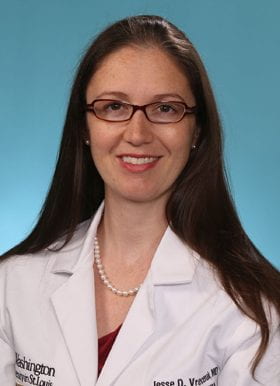
Jesse Vrecenak, MD, leads a research laboratory investigating fetal cell and gene therapy to address diseases in utero. Her primary focus is in the area of fetal conditions, including gastroschisis, which affects the abdominal wall of a fetus in utero. Vrecenak is site Principal Investigator of a multi-center clinical trial funded in part by the National Institute of Child Health & Human Development, part of the NIH, to determine the optimal time to deliver a baby with gastroschisis. The lab has received funding from the American Surgical Association, as well as a Faculty Research Award. For more information, contact Dr. Vrecenak at vrecenak@wustl.edu or at (314) 454-6022.
Warner Lab
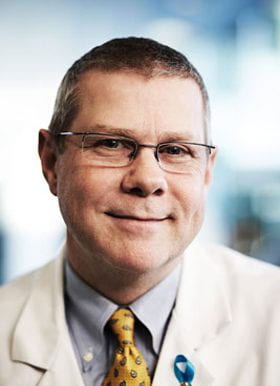
The Intestinal Adaptation Laboratory at St. Louis Children’s Hospital, led by Division Chief of Pediatric Surgery Brad Warner, MD, and Jun Guo, PhD, seeks to understand the mechanisms through which the intestine adapts to massive intestinal loss. The laboratory team blends sophisticated molecular biology techniques with clinically focused relevant applications. The technology utilizes transgenic, knockout and mutant mice in a unique intestinal resection surgical model. In addition, laser capture microdissection (LCM) microscopy is used to study adaptation in isolated cells of the small intestine. For more information, contact Dr. Warner at brad.warner@wustl.edu or at (314) 454-6022.
The Section of Abdominal Transplantation maintains a strong interest in basic and clinical research related to liver, kidney, and pancreas transplantation and non-transplant surgical conditions. Recent research has included NIH-funded studies to study kidney transplant programs, several Phase II and Phase III trials exploring novel immunosuppression protocols, and investigations into the risk factors for rejection and infection in pediatric liver transplantation. They are one of three teams involved in a study utilizing Facebook to enhance living donations of waitlisted organ recipients. Their funding comes from a number of different organizations, including American Transplant Congress, American College of Surgeons, Association for Academic Surgery, Academic Surgical Congress, American Association for the Study of Liver Diseases, and Americas Hepato-Pancreato-Biliary Association.
Chapman Lab
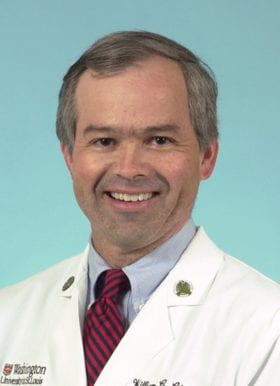
William Chapman, MD, the Eugene M. Bricker Chair of Surgery, Section Chief of Transplant Surgery and Chief of General Surgery, performs liver transplant surgery and conducts research with a focus on improving access to and outcomes of liver transplantation. His primary research area is ischemia-reperfusion injury to increase the liver donor pool for patients with hepatocellular carcinoma and end-stage liver disease from other causes. Over the last six years, he has established a clinical outcomes research group, working closely with Dr. Yikyung Park and other members of the Division of Public Health Sciences at Washington University School of Medicine in St. Louis. Their research aims to reduce ischemia-reperfusion injury associated with liver and kidney transplants, expand the donor pool, and improve outcomes for all patients undergoing solid organ transplantation. They were one of the leading centers in the OrganOx randomized trial assessing normothermic machine perfusion compared with standard cold storage. In addition to gaining substantial clinical experience with this new technology, they also established regular collaborations with the other participating sites in a proposed RESTORE II trial. For more information, contact Dr. Chapman at chapmanw@wustl.edu or at (314) 362-7792.
J-S Kim Lab
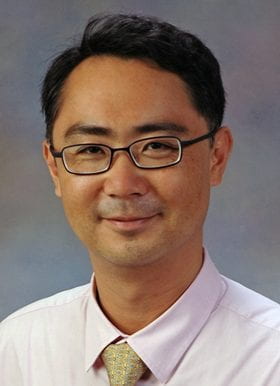
Jae-Sung Kim, PhD, Professor of Surgery, studies the roles of mitochondria and autophagy in liver ischemia-reperfusion injury, using cell and animal models. His research focuses on novel therapeutic strategies to improve liver function after ischemia-reperfusion injury resulting from transplantation, hemorrhagic shock and liver resection surgery. For more information, contact Dr. Kim at kjaesung@wustl.edu.
Minimally Invasive Surgery faculty members are leaders in their fields of research which include outcomes for gastrointestinal laparoscopic procedures, metabolism in morbidly obese patients, and the development and testing of biomaterials used in hernia repair. When the Washington University Institute for Minimally Invasive Surgery was established in 1993, it was the first multidisciplinary group of surgeons in the country formed to advance research, education and patient care in minimally invasive surgery. Recent research has focused on alterations in metabolism for gastric bypass surgery patients, the biology of paraesophageal and hiatal hernia formation, and paraesophageal hernia repair.
Brunt Lab
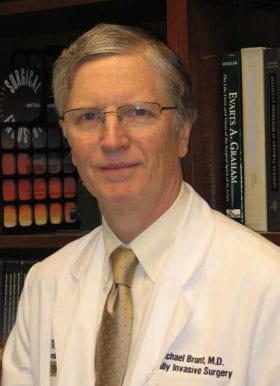
Michael Brunt, MD, the Pruett Family Professor of Surgery and Section Chief of Minimally Invasive Surgery, conducts research focused around several subject areas:
- Outcomes studies in minimally invasive adrenalectomy
- Safety in laparoscopic cholecystectomy
- Opioid use and pain management in surgical patients
- Outcome studies in sports hernia and athletic pubalgia
- Studies in surgical education
One of his recently published studies investigated the incidence of bile duct injury across large populations using administrative and payor claims data. Another studied strategies for reducing complications of biliary injury during cholecystectomy. Recent research from his lab linked prescribing practices and patient opioid use post-discharge to patient pain scores and other variables after surgery, leading to a significant reduction in the amount of opioids that are given to surgical patients. Residents who join the lab usually work with one primary mentor but have the opportunity to work with additional faculty members as well. There is the potential for industry-related funding or funding through society grants and the Barnes-Jewish Hospital Foundation grant program. For more information, contact Dr. Brunt at bruntm@wustl.edu.
Over the past century, research has been an important focus of the Plastic and Reconstructive Surgery faculty at Washington University School of Medicine. Dr. Vilray P. Blair, one of the founders of the plastic surgery specialty, joined the faculty in 1902. Blair not only became a leader in research — setting the standard for craniofacial construction and developing many new techniques — but also trained many plastic surgeons who made important contributions in the field. Today, faculty members continue that tradition of excellence, acquiring over $15 million in awards from 2000 to date. Currently, they hold $6.5 million in active awards and have cumulatively published more than 1,200 peer-reviewed manuscripts, as well as over 100 books and chapters.
Tissue Engineering Lab

Xiaowei Li, PhD, researches the development of biomaterials platforms for regenerative medicine, with specific interest in stem cell engineering, tissue regeneration, and the applications of biomaterials for angiogenesis and vascularization. By combining principles of biomaterial science, biological science, stem cell biology, tissue engineering, and regenerative medicine with advanced techniques in molecular and cell biology, his lab is developing new bioengineering strategies for tissue regeneration. Specifically, they aim to induce a permissive microenvironment to improve efficiency of stem cell therapies for regeneration of injured or diseased tissues. They also apply biomaterial platforms to influence endogenous cell fates to promote functional tissue regeneration. For more information, contact Dr. Li at xiaoweili@wustl.edu and at (314) 273-5135.
Wood Lab

Matthew Wood, PhD, serves as Scientific Director of the Plastic Surgery Research Laboratories, a multi-investigator laboratory interested in basic science and translation in plastic and reconstructive surgery. Their research focuses on improving the surgeon’s capabilities to manage injuries and reconstruct tissue through basic studies and bioengineering approaches. They have won independent federal funding to study the role of T cells in aiding regeneration across biomaterials, as well as how to modulate T cell-regulated responses to improve regeneration. Currently the lab is interested in understanding how electrical stimulation can be used to improve tissue regeneration, both in the context of nerve injury and repair, as well as how nerve regeneration and electrical stimulation-augmented regeneration can improve functional soft-tissue regeneration. For more information, contact Dr. Wood at woodmd@wustl.edu.
Christensen Lab
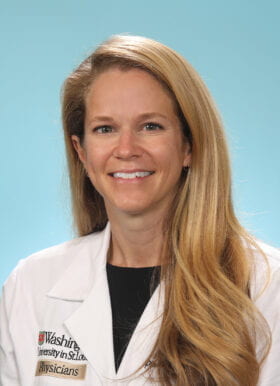
Joani Christensen, MD, conducts research related to lymphedema surgery, breast reconstruction, lower extremity reconstruction and patient-reported outcomes. Specifically, her lab focuses on clinical and translational studies in indications and outcomes of lymphedema surgery, as well as outcomes in general reconstruction and breast reconstruction. For more information, contact Dr. Christensen at c.joani@wustl.edu.
Washington University physicians in the Section of Surgical Oncology are involved in leading research efforts to investigate cancer of the breast and of the endocrine system. They are responsible for identifying the Multiple Endocrine Neoplasia Syndrome-2 (MEN-2) gene. Currently the department is researching the immune response to various human tumors, especially breast, ovarian and pancreatic cancer. They provide surgical trainees the opportunity to develop fundamental skill sets in basic science, translational and public health research, including a focused mentored research experience and formal coursework.
Fields Lab
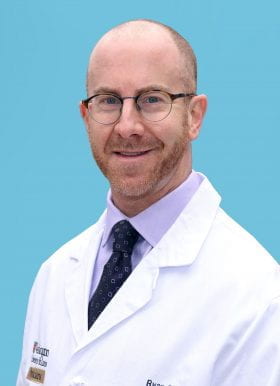
Ryan Fields, MD, the Kim and Tim Eberlein Distinguished Professor of Surgery and Chief of Surgical Oncology, has been continuously funded by the NCI since 2013. His research group focuses on three main areas:
- Mechanisms of cancer metastases
- Cancer “-omics”
- Novel in vitro and small animal models of cancer
The Fields lab directly compares primary and metastatic solid tumors, leveraging their expertise and strength in high-quality biospecimen procurement and science. In conjunction with collaborators at The McDonnell Genome Institute at Washington University, they employ comparative genomic, transcriptomic, and epigenetic techniques to identify differences in mutational profiles between metastatic and primary tumor tissue. Pathways found to be critical in the acquisition of a metastatic phenotype are further explored. This has led to the creation of the multi-disciplinary “Team Science” Cancer Genomics working group, which fosters multi-PI projects and collaborations.
In the area of cancer modeling, the lab is working to improve the pre-treatment evaluation of diagnostics and therapeutics by developing novel small animal and in vitro models of cancer. Dr. Fields is the PI of an NCI-R01 to develop a humanized mouse model of cancer to evaluate cancer biology and immunology. He is also the PI of an NCI-R21 to develop a novel “tumor-on-a-chip” high-throughput, in vitro model system.
Dr. Fields has significant expertise and experience leading large-scale human tumor collection efforts. He serves as the PI of the Biospecimen Core of the Washington University SPORE in Pancreatic Cancer and Co-PI of the PDX Development Unit for the Washington University PDX U54 Clinical Trial Program. He is also Co-PI of the Washington University “Cancer Moonshot” U2C Human Tumor Atlas Network (HTAN) program that is evaluating resistance and response to treatment across space and time in pancreatic and breast cancer. As the director of the Solid Tumor Tissue Bank and Registry, Dr. Fields has overseen the collection of >2,000 human tumors and creation of >20,000 derivatives. They have an IRB-approved tumor collection and patient-derived xenografting (PDX), cell line, and organoid creation effort. They work in a multi-disciplinary, collaborative effort to evaluate and translate these model systems into tools that can be used to evaluate novel therapeutics in translational oncology.
Dr. Fields is also the Co-PI of the Washington University Participant Engagement and Cancer Genome Sequencing (PE-CGS) Center. In this U2C “Cancer Moonshot” program, investigators are studying rare and underrepresented cancers of relevance to our catchment area (cholangiocarcinoma, colorectal cancer in Black patients under the age of 50) to better understand and improve the process of patient engagement and genomic-focused clinical trial participation in rare and under-studied and under-represented/minority cancers. In addition, Dr. Fields is the Co-PI of the Washington University U54 Senescence Network (SenNet) initiative, which extends biospecimen science initiatives beyond cancer to study the process of cellular aging and its impact on human biology and disease.
For more information on opportunities available in the Fields research group, please email Dr. Fields at rcfields@wustl.edu.
Aft Lab
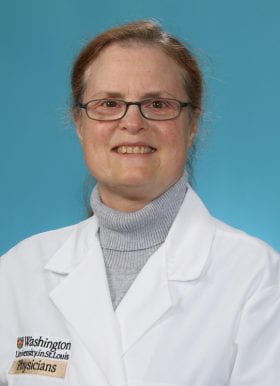
Rebecca Aft, MD, PhD, the Jeffrey F. Moley Professor of Surgery, studies micro-metastases in breast cancer. Currently, she is co-principal investigator of an R01 grant characterizing disseminated tumor cells (DTCs) in breast cancer patients. Aft and her co-investigators have developed a strategy for identifying genes associated with DTCs, with the goal of implementing targeted therapies to eliminate these cells and interrupt metastasis. Her lab’s research goals revolve around DTCs, using them to predict distant disease development in triple negative breast cancer (TNBC) patients, to understand subpopulations of bone marrow DTCs in therapy-resistant TNBC patients, and to understand alterations in specific T cell and conventional dendritic cell populations in bone marrow. The lab’s aim is to better understand immune escape and heterogeneity of micrometastatic disease as well as biomarkers for improving conventional and ICI therapy in TNBC patients. For more information, contact Dr. Aft at aftr@wustl.edu or (314) 747-7222.
The Division of Public Health Sciences conducts world-leading research, education and outreach, focusing their energy and expertise on making communities and populations healthier, in Missouri and beyond. Many surgery residents collaborate with division faculty on projects that affect strategies in clinical care and outcomes. Current research projects include eliminating local health disparities, conducting health services and comparative effectiveness research, improving service delivery, and measuring outcomes for cancer survivors and other patient groups after major clinical or disease events. Residents are encouraged to contact division leadership to explore opportunities to lead and collaborate on research projects within the division.
Politi Lab
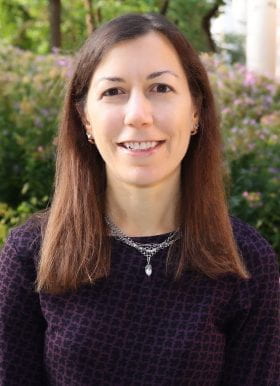
Mary C. Politi, PhD, a professor of surgery, studies health communication and shared decision-making, with a focus on reducing health disparities by engaging communities with unmet health needs. Her work helps patients and the public understand health information, explore their medical options, and make informed decisions that meet their needs. She also trains health care professionals, public health advocates and members of the public interested in shared decision-making and patient engagement. Dr. Politi works extensively with stakeholders to ensure her research is relevant to end users in clinical and community settings. The lab has many funding opportunities available, including pilot grants through the new center for perioperative mental health, pilot grants through the Implementation Science P50, and federal grant opportunities. For more information, contact Dr. Politi at mpoliti@wustl.edu.
Toriola Lab
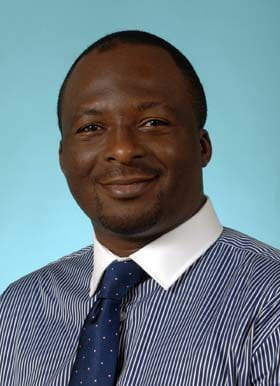
Adetunji Toriola, MD, MPH, PhD, studies biomarkers, metabolic imbalance, and inflammation, and their application in cancer etiology and prognosis with a focus on breast and gastrointestinal cancers. His lab has successfully translated findings from epidemiology studies into clinical trials that could have an impact on breast cancer prevention. Currently his lab is conducting three NIH-funded studies: two seek to understand the molecular basis of mammographic breast density, especially in premenopausal women, and how this can be utilized in breast cancer prevention; the third, the ColoCare Study, collects comprehensive clinical data, information on health behaviors, and biospecimens from 4,000 multiethnic colorectal cancer patients at multiple time points (prior to surgery and 3, 6, 12, 24, 36, 48 and 60 months post-surgery). The lab provides a productive research environment with the opportunity to use previously collected data and biospecimens to address novel clinical, public health, and translational research questions. For more information, contact Dr. Toriola at a.toriola@wustl.edu or (314) 286-2668.
Cao Lab

Yin Cao, MPH, ScD, is a cancer epidemiologist with extensive training and track records in epidemiologic study design and molecular/nutritional/clinical epidemiology. She specializes in systems and translational epidemiology to uncover novel lifestyle, microbial, and genetic risk factors for cancers, with an overarching goal to develop precision-based cancer prevention/control strategies. Her early work focused on risk prediction, screening, and chemoprevention of gastrointestinal malignancies. Current projects in the Cao lab incorporate high-throughput technologies (genomics, proteomics, microbiome, accelerometers) into large-scale collaborative epidemiology/clinical studies to address provocative questions in cancer prevention, including but not limited to:
- Etiology and early detection of early-onset cancers
- Biological basis for cancer disparity
- Role of the microbiome and host immunity in carcinogenesis
These projects leverage data and biospecimens collected from deep-characterized population-based cohorts, genetic consortium, and claims/EHR data. Cao lab is recognized for early-onset colorectal cancer etiology research and is currently expanding efforts to other cancers with a rising incidence in younger ages. Dr. Cao has published over 100 research papers in leading medical journals, including senior-authored publications in JAMA, JAMA Oncology, Gastroenterology, Gut, JNCI, and Nature Reviews Clinical Oncology. For more information, contact Dr. Cao at yin.cao@wustl.edu or (314) 747-3952.
Waters Lab
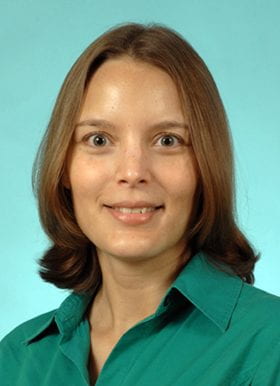
Erika Waters, PhD, MPH, a professor of surgery, translates foundational epidemiological and clinical science into forms that help laypeople make adaptive health decisions. One branch of her research explores the variety of cognitive, emotional, and socio-contextual factors that shape how people make decisions about their own health. A second branch conducts foundational studies to develop traditional, eHealth, and mHealth strategies to improve public health behaviors. Her lab is currently engaged in four primary research projects:
- Exploring how caregivers of children with asthma think about their child’s risk of having an exacerbation.
- Examining how internet-based health risk calculators, such as Your Disease Risk, can be used to affect people’s thoughts, emotions and behaviors, including their possible role in alleviating health disparities.
- Understanding the causes and consequences of laypeople’s uncertainty about their risk of cancer and other diseases.
- Understanding how, why, and under what circumstances people’s medical treatment decisions are influenced by the risk of experiencing medication side effects.
Dr. Waters’s lab has a particularly strong interest in developing, implementing, and disseminating strategies that meet the needs of marginalized populations, including people of color, as well as people with limited education, health literacy, or numeracy. For more information, contact Dr. Waters at waterse@wustl.edu, or at (314) 747-5705.
James Lab
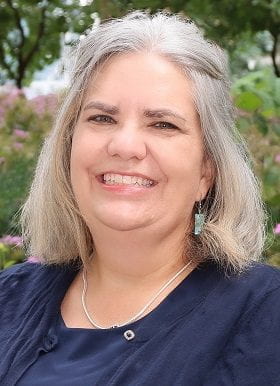
Aimee James, PhD, MPH, a professor of surgery, conducts research focused on reducing health disparities, promoting health equity, and improving patient experiences with healthcare. The lab’s work centers on cancer prevention and control, and implementation of guideline-based care in under-resourced settings, or for people from marginalized groups. Common methods include qualitative and survey research, mixed methods, community and stakeholder engagement, as well as intervention and implementation science. Trained in social psychology and public health, Dr. James is committed to research that appreciates the context and circumstances under which people may or may not access (or be able to access) healthcare, how they can support quality healthcare, and improve the experience for patients, their social networks, and providers. For more information, contact Dr. James at aimeejames@wustl.edu.
Ying Liu Lab
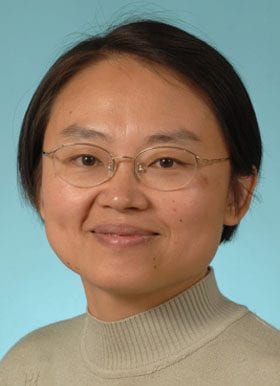
Ying Liu, MD, PhD, is a cancer epidemiologist whose primary research focuses on breast cancer prevention and prognosis, and cancer disparities. Specifically, Dr. Liu’s research examines early life factors associated with breast cancer and its intermediate risk markers, biomarkers that are associated with the progression of premalignant breast diseases, barriers to high-quality cancer care and their associated cancer outcomes for patients on Medicaid, the roles of patients, providers, and neighborhoods in cancer disparities, and cancer risk prediction models. The lab is currently engaged in several disparity-focused research projects, including:
- Investigating healthcare access domains (i.e. affordability, availability, accessibility, accommodation, and acceptability) as contributing causes to the higher risks of treatment underutilization and thereby mortality in African American vs White American patients with lung cancer
- Understanding the role of residential instability in patients’ adherence to cancer treatment and cancer outcomes in low-income women with breast cancer
- Identifying the multi-level factors contributing to racial disparities in the progression of pre-cancer lesions to invasive breast cancer.
- Identifying the underlying molecular mechanisms for the higher risks of developing triple negative breast cancer and chemoresistance in African American women compared to White American women.
The goal of these studies, funded by NIH and the American Cancer Society, is to better understand cancer disparities and produce solid evidence that will help improve health for everyone, regardless of their race/ethnicity, socioeconomic status, and zip code. Dr. Liu has mentored and advised more than 10 medical students and postdocs in research. For more information, contact Dr. Lui at yliu3@wustl.edu.
Hall Lab

Bruce Hall, MD, PhD, a professor of surgery in the School of Medicine and professor of Healthcare Management for the Olin Business School, currently serves as Vice President and Chief Quality Officer for BJC HealthCare and leads the Clinical Advisory Group for the BJC Center for Clinical Excellence. Dr. Hall oversees clinical advisory services focusing on identification of high-impact clinical quality, coordination, integration, and resource management issues, and efforts to address such issues relevant to priority populations. His research focuses on the evaluation of quality in medicine and surgery, particularly as it pertains to individual providers and their contribution to the health care system. Currently he is conducting Health Services Research involving alternative payment structures, insurance policy issues, and ACS NSQIP databases, as well as other large data sets. Dr. Hall is also interested in the theory of risk adjustment. For more information, contact Dr. Hall at hallb@wustl.edu.
The Division of Urologic Surgery conducts cutting-edge research focused on urologic cancers. Professor of Surgery Nupam Mahajan, PhD, leads a basic science laboratory investigating therapeutics for prostate and breast cancers.
Nupam Mahajan Lab
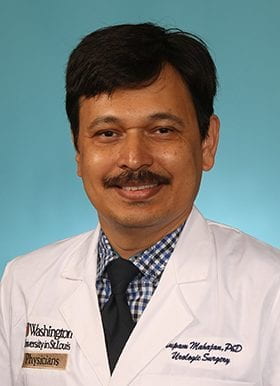
Nupam Mahajan, PhD, professor of surgery, Endowed Professor of Cancer Research, and Director of Urological Research, conducts research on developing therapeutics for prostate and breast cancers. He is especially interested in how tyrosine phosphorylation regulates epigenetic processes that affect cellular homeostasis, immune impairment and cancer cell survival. His lab has discovered two new epigenetic events, developed a new class of a small molecule inhibitor for ACK1, and identified a novel class of WEE1 epigenetic inhibitor. Most recently the lab identified an RNA molecule that suppresses prostate tumors. This research has become the basis for the establishment of TechnoGenesys, Inc., a startup focusing on developing new cancer drugs. Funded by the National Institute of Health, The National Cancer Institute, and Prostate Cancer Foundation (among others), the lab is currently accepting graduate students in Cancer Biology, Molecular Genetics & Genomics, Molecular Cell Biology, Human & Statistical Genetics. For more information, contact Dr. Mahajan at nupam@wustl.edu or 314-273-7727.
The Section of Vascular Surgery oversees the vascular diagnostic laboratory at Barnes-Jewish Hospital and also is responsible for the Vascular Surgery service. Researchers in vascular surgery study the mechanisms that influence arterial collateral formation and peripheral arterial atheroprogression in the setting of diabetes, as well as the pathophysiology of abdominal aortic aneurysm. The section actively participates in clinical trials of minimally invasive devices in collaboration with industry.
Zayed Lab
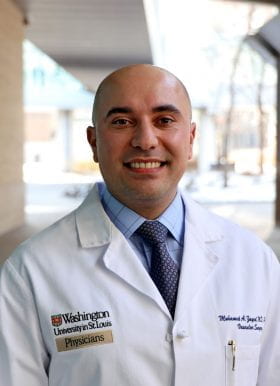
Surgeon-scientist Mohamed Zayed, MD, PhD, leads translational and bioinnovation research at Washington University School of Medicine in St. Louis. The Zayed Laboratory studies the mechanisms that influence arterial collateral formation and peripheral arterial atheroprogression in the setting of diabetes. Zayed aims to better understand why diabetic patients have a significantly higher incidence of developing peripheral arterial disease (PAD) and are at increased risk of malperfusion at healing surgical sites. The laboratory hypothesizes that arterial phospholipid tissue expression and processing play a central role in this process. The team of scientists explores this using a complement of biochemical assays, in vivo animal models, and biobank of vascular tissue specimens. The vascular clinical team translates its findings from bench-to-bedside through ongoing clinical research trials. Ultimately, the aim of the Zayed Laboratory is to develop effective new therapeutic modalities for the treatment of diabetic patients with progressive PAD. Zayed also leads the Vascular Surgery BioBank, an IRB-approved, funded, physician-investigator led initiative that aims to collect, process and distribute human vascular specimens for scientific investigation. For more information, contact Dr. Zayed at zayedm@wustl.edu or (314) 362-5684.